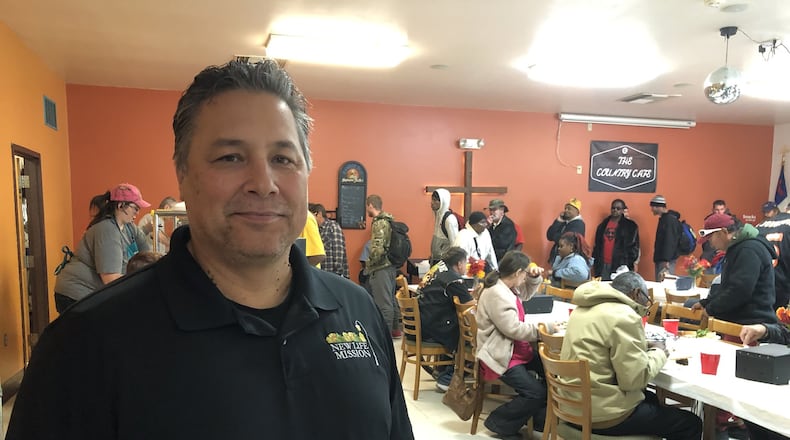Residents need options, so Russo wants his organization to be a hub of resources that aid the poor, the homeless and the addicted, helping connect them to mental-health therapy, and organizations like Butler County Job and Family Services and veterans agencies that can help them with jobs, health-care coverage, food assistance and life coaching.
In the past year, the issue of homelessness has risen in Hamilton and elsewhere across the county, with officials working to contain homeless camps while informing residents about how to find help. Along the way, police and social-service agencies have been frustrated by people who take things to the homeless camps, saying that only encourages people to keep living in tents near railroad tracks, in woods or in fields.
Russo agrees such help is a bad idea.
“As well-meaning as they are, wanting to help people on the street — and I’ve seen an explosion of groups the last couple of years, going out on the street and just giving things to people,” he said. “They feel like that’s helping people, and it’s really not.
“Number 1, it takes away any initiative. Why should I make a change in my life if people are going to be bringing me everything I need — whatever food I want, anything I need, clothes, whatever, directly to me in my homeless camp, that takes away the initiative to want to move out of that life situation.”
Russo said he has seen a rise in millennials and senior citizens on the streets, and human trafficking is part of the problem.
“And these groups that are just going out and inundating people with stuff — and they’re enabling — do they really step back and go, ‘You know what? I’m enabling traffickers,’” he said. “Some guy’s using a girl because she’s high all the time, and using her to get money, that’s trafficking.
“You’re enabling him to traffic her out on the street.”
He’s familiar with such issues, because his wife, the Rev. Kim Russo, operates Juliette’s Hope in Lockland, a two-year program that helps women, mostly from Butler County, break away from addiction and prostitution.
Hamilton police and Butler County United Way earlier this year teamed in an effort that encourages people wanting to help the needy do so through United Way agencies.
RELATED: How to help the homeless through local agencies
Most people who know about New Life Mission believe it is only a soup kitchen, and maybe a food pantry. It’s a place that people who use it have come to trust.
Russo wants the organization to become a hub for helping the poor, the homeless and the addicted, helping connect them to mental-health therapy, and organizations like Butler County Job and Family Services that can help them with jobs, health-care coverage and food assistance.
The mission, located in a single-story building, has a new strategic plan calling for it to become “a hub of resources,” for those in need, Russo said.
“This is a good location,” he said. “People are already coming here for lunch. We’ll get 20 to 50 families come through the food pantry, daily.”
It’s already becoming a hub, helping connect people with Butler County Job and Family Services, and people who provide mental-health assessments.
Of the 81 people served at the JFS onsite visits in October, 61 were assisted at New Life Mission, the agency told him.
“I think that is the right place,” for such a place to help people, said county Commissioner Cindy Carpenter. “We’ve been so successful in putting a JFS staff person in the community meal center, and that person is qualifying individuals for Medicaid and Food Stamps, which are first steps to coming out of chronic homelessness. A big part of it is to get on medication.
“He is the boots-on-the-ground person who probably serves this population more than anyone else, because the people he serves are the neediest of the neediest, and with the most complicated mental health and addiction problems.”
Russo wants to convert part of the mission’s building to private showers for men and women.
“People deserve to be treated with dignity,” he said. “Something that’s needed right now are showers. Just the basic health, it goes with dignity, and it goes to employability.”
He’d love to help some people find their way to religion, he said.
“But first and foremost is about loving people,” he said. “Show people love, then as that relationship builds, people will begin trusting you to where you can start going, ‘Hey, these are your options. They’re here if you want them.’”
About the Author
